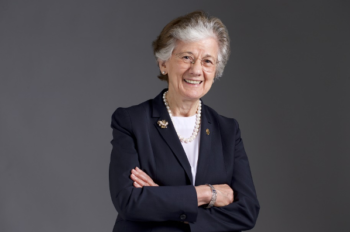Professor Rita Colwell: winner of the Prize Medal 2014
Posted on May 20, 2020 by Microbiology Society
Each year, the Microbiology Society awards five Prize Lectures in recognition of significant contributions to microbiology. The awards celebrate the outstanding applications of microbiology to research, education and translation and all members are invited to nominate an outstanding microbiologist for the Microbiology Society Prize. We got in touch with former Microbiology Society Prize Medal Winner Professor Rita Colwell (University of Maryland, USA) to find out how the award has since impacted her research.

My research is focused on the linkages between the environment and infectious disease, with cholera as the primary model. The work began very early, when I was a graduate student and employed numerical taxonomy to identify marine, estuarine, and brackish water bacteria, writing a computer program to identify and characterise the isolates. The aquatic bacteria that I had isolated and studied as a graduate student were predominantly in the genus Vibrio.
The research led to the discovery that Vibrio cholerae is an aquatic bacterium that can be isolated from the natural environment and has the small crustacean copepod as its host. This research led to the discovery that seasonality of cholera in Bangladesh could be linked to seasonality of zooplankton, namely the copepod. Subsequent work showed that the cholera vibrio undergoes a viable, non-culturable stage in its association with its copepod host and that this viable but noncultural (VBNC) stage is common to many bacteria, particularly Gram-negative bacteria. My work progressed to applications of next generation sequencing and metagenomics.
How has your work developed since winning your Prize?
Since being honoured with the Prize Medal, my research has expanded significantly in development of a predictive model for cholera epidemics, employing satellite sensors to determine environmental and population distribution parameters employed in the model. Currently my work, which continues with my former postdoctoral fellow Dr Antarpreet Jutla, Associate Professor at the University of Florida, is being applied to the cholera epidemic in Yemen. This work is now being done in a wonderful collaboration with the Department for International Development, the British Meteorological Office, UNICEF, NASA, the University of Florida and the University of Maryland, College Park. Currently, we are able to provide cholera risk estimates for Yemen four weeks in advance and are working toward an eight-week advance prediction.
What was the highlight of delivering your lecture?
The highlight of delivering my lecture was the ability to discuss my research with outstanding scientists at the Microbiology Society’s Annual Conference, and to have the opportunity to present new findings to a very distinguished scientific society.
Why do you believe it is important to nominate colleagues for the Society’s Prize Lectures?
It is very important to nominate colleagues for the Society’s Prize Lectures as it is an excellent forum for a scientist to present new ideas and hypotheses. If one has a creative idea that is out of the ordinary track, it is a splendid way to reach fellow researchers and gain new thinking and perhaps gain even more creative thinking about one’s idea.
How did you find your overall experience from being nominated for the award to giving your talk?
The overall experience from being nominated for the award to giving my talk was totally positive; a great pleasure in fact. Firstly, to be informed that I had been selected was a surprise…a very pleasant surprise. Attending the Microbiology Society meetings is always enjoyable but the meeting at which I gave the Prize Lecture was especially a lot of fun…meeting friends and colleagues in a very congenial environment. I have a great fondness for all of the UK. To spend time in that wonderful part of the world is always a grand adventure and a delight for me!
Nominations for the 2021 Prize Lectures and the 2022 Prize Medal lecture are now welcomed
To nominate someone for a Prize Lecture, please visit the relevant Prize Lecture page to find out more about its remit, judging criteria and past winners of the Prize. You will also be able to download the nomination form on this page.
After you’ve read the form to determine what to include, you and your fellow nominator should contact the person you’d like to nominate so that you can work with them to complete the nomination form. Nominators should be members of the Society, but the candidate does not have to be one. We have provided example nomination forms to demonstrate the level of detail required for nominations.
To submit your nomination, please email the completed form along with any supporting documentation to [email protected].
If you have any queries, would like to be put in touch with a second nominator or would like to talk through your ideas for a nomination, you can contact the Microbiology Society Prizes team for support via email at [email protected].

